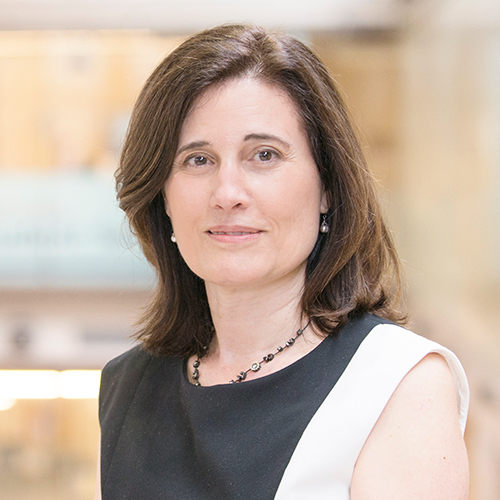From undergraduate study at the Aristotle University of Thessaloniki, Greece through to the past 22 years in the Faculty of Engineering and Applied Science at Queen’s, Dr. Marianna Kontopoulou has learned to balance minding the details with focusing on the big picture.
She began her Queen’s journey as Assistant Professor in the Department of Chemical Engineering in 1999 before advancing to Associate (2006) and then full Professor (2013). As of July 2018 she is Associate Dean (Academic), a wide-ranging role that incorporates student wellness and academic administration and development.
“A main aspect is working with student services on overseeing the academic progress of all the students in the Faculty,” she said. “This includes overseeing supports and working with student services staff on the relevant processes, providing academic counselling etc. I also interface with programs on program administration, curriculum initiatives, program/curriculum development and anything else that is relevant to academic programming. I am responsible for admissions and recruitment for the faculty, and transfer students.”

Associate Dean (Academic) Marianna Kontopoulou
She exemplifies the tenet that engineering provides a broad starting ground for people interested to expand beyond the profession. As she moved into administrative roles within the faculty, Kontopoulou found herself increasingly prepared to take on roles outside chemical engineering.
“Engineering training inherently prepares you for problem solving,” she said. “Especially chemical engineering helps you with system thinking – that holistic view of things, where you understand that if you change something somewhere in the system it may have all sorts of cascade effects. This is why I think chemical engineers become good administrators. Before becoming Associate Dean, I had been involved with other administrative positions in my department, like Associate Head, which helped a lot, because the department is essentially a “microcosm” of the world at the faculty level.”
As is common in the industry, Dr. Kontopoulou came upon engineering as a field of study via an interest in science.
“I am probably one of the classic examples of a high school student who didn’t know the difference between chemistry and chemical engineering!” she said. “I was good at everything in high school, with more of a preference in the science courses, but I didn’t really grasp what engineering was. I certainly wasn’t aware of the concept of ‘design.’ My father was a process/metallurgy engineer, and he certainly influenced me towards deciding on engineering – he did say to me that ‘you can do anything with chemical engineering,’ which is still true of course.”
In practise that has meant balancing minutiae with the wide-angle perspective, taking care of the details but not losing sight of the overall goal. “No matter how difficult or insurmountable a problem looks,” she said, “there is always a solution if you think creatively and have an open mind. It is always important to look at the big picture, without getting lost in the details. On the other hand, many times the devil is in the details, so it is important to deal with them carefully as well.”